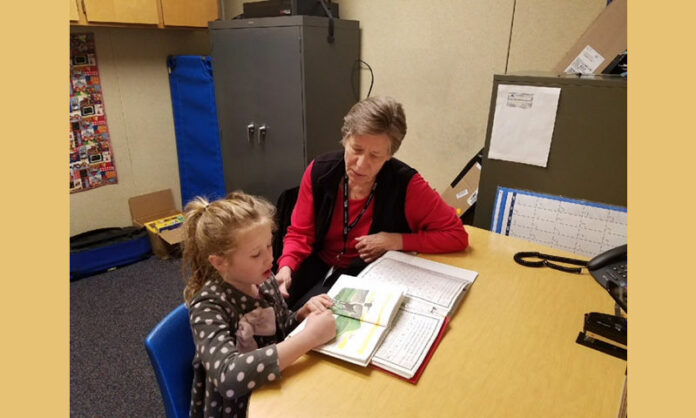Program pairs volunteers, students for one-on-one tutoring at Geyserville Elementary
Deficits in reading achievement can be one of the hardest things for students to overcome, and can have the greatest impact on a student’s future success. That’s why, in 2009, the United Way of the Wine Country began looking for a way to help local students close that gap, as a gateway to future success. The program is currently in use in the first grade at Geyserville Elementary School.
A report generated by United Way of the Wine Country at that time offered several ideas, including one out of Dane County, Wisconsin, called Schools of Hope.
“There was a United Way that had developed the program and they had seen really great results from this one-on-one tutoring program,” Nicollette Weinzveg, Education Program Officer for United Way said. “Their goal was to close the reading achievement gap in third grade. They had launched their program in ‘95 and in 10 years they had eliminated their reading achievement gap in their county. We saw this as an amazing program to model after.”
Weinzveg said they convened both a focus and working group, including administrators from six different elementary school districts, the Sonoma County Office of Education and other nonprofit partners in the community to examine the program and “develop a literacy program for our region’s unique needs.”
They started in just six schools, as a pilot. “We did that so we could make sure it would work across districts. That it wasn’t just working for one. We started in six schools and districts and now we’re in 27 schools and 16 districts.”
Not only does United Way of the Wine Country operate the program in Sonoma County, it also runs the program in Lake and Mendocino counties.
The program pairs volunteers from the local, individual and business communities with students in need.
“We ask for them to commit to 30 minutes once a week for the school year. It starts in October and runs through May. The model is the student is seen twice a week for 30 minutes. Sometimes it’s the same tutor or sometimes they have different ones. The data is really pointing to the one-on-one interaction between the tutor and the students,” Weinzveg said, adding the program is available for Kindergarten through third graders, though the majority of participants are first and second graders.
Some volunteers come from United Way’s workplace campaigns, and local employers allow their workers to volunteer for the program during the workday. Others are members of the local community with time to donate. Some volunteers work in the communities where they live while others work in the communities where they work.
“We recruit through social media, word of mouth, newspapers. We give presentations at senior centers, to the Rotary Club. We’ve got a good mix of volunteers from the corporate world and the community,” she said.
No particular experience is necessary, and the program provides a mandatory two-hour training session. “It goes over the curriculum and what is involved in a tutoring session,” she said. “Why its important, how it relates to a child’s learning. You don’t have to have any teaching experience. We give them all the training necessary.”
Every year Schools of Hope gives its data to Sonoma State University to evaluate the efficacy of the program. In the 2016-2017 school year, 475 students participated in the program, 31 in Kindergarten, 272 in first grade, 129 in second grade and 32 in third grade.
In that school year, 48.2 percent were English learners and 61.9 percent were eligible for free and reduced lunch. These scores are compared to a control group who do not participate in the program. Seventy percent of first grade participants reached proficiency at the end of the school year, compared to 55 percent of non-participants. In addition, 77 percent of second graders reached proficiency compared to 57 percent of non-participants.
Principal of Geyserville Elementary School Denise McCullough said getting their program going this year has been difficult due to the fires, but that the program is valuable to her school and students.
“(We’ve) had volunteer tutors come and work with our first grade students, read with them, work on certain skills like phonics, sounding out words and just skills that are needed for early literacy,” she said. “It’s wonderful that they take their time and give it to our students for no cost. We’re very thankful.”
While the data-driven benefits are good, McCullough is also inspired by the less tangible benefits. “We’ve seen firsthand a joy of reading that develops when kids feel more successful in reading,” she said. “We’ve seen reading skills improve and just general overall improvements in the area of reading.
“One thing I’ve noticed about the volunteers is that they are very patient and kind with the students,” she continued. “They are very gentle human beings, very sweet. We are so grateful for Schools of Hope giving this opportunity to our students.”
The recruitment period for the spring semester has concluded, but Weinzveg said they will begin recruiting again in August for October. She also mentioned that of all the districts they serve, Geyserville is currently the most in need of volunteers.
To get more information on Schools of Hope, check out unitedwaywinecountry.org/our-work/education/schools-of-hope.
59.6
F
Healdsburg
April 18, 2025








